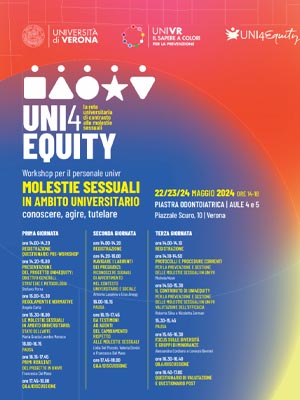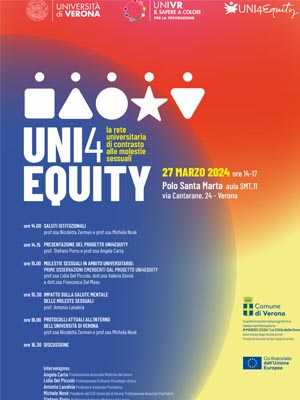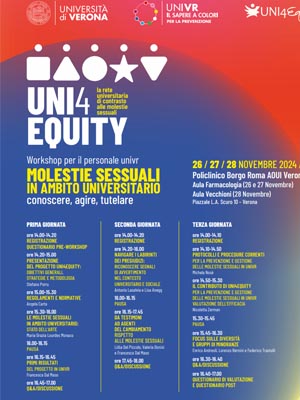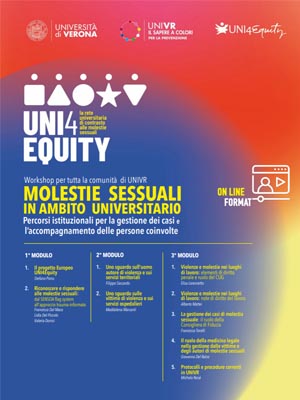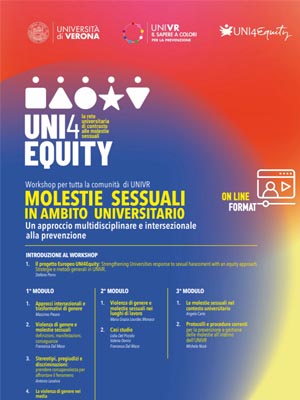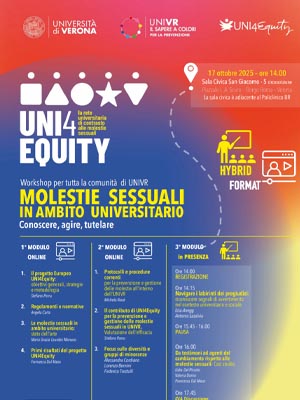- Uni4equity
- Sexual harassment prevention and awareness policies at the University
Sexual harassment
Prevention and awareness policies at the UniversityDefinitions
- SEXUAL HARASSMENT
-
[...] any form of unwanted verbal, non-verbal or physical conduct of a sexual nature, with the purpose or effect of violating the dignity of a person, in particular when such conduct creates an intimidating, hostile, degrading, humiliating or offensive environment, whether such conduct is subject to criminal or other legal sanctions (Istanbul Convention – Article 40 – Council of Europe, 2011)
- GENDER DISCRIMINATION
-
Any behaviour based on a person's sex aimed at violating their dignity and creating an intimidating, degrading or offensive environment.
- SEXUAL VIOLENCE
-
Any sexual act perpetrated against a victim without consent. Sexual violence may include sexual harassment, sexting and sexual assault, including rape (for example, marital rape or date rape), committed by intimate partners or others.
- ONLINE HARASSMENT
-
Harassment through e-mail, text (or online) messages or the internet. It can include: unsolicited sexually explicit e-mails or messages; inappropriate or offensive advances on social networking sites or in chat rooms; threats of physical and/or sexual violence via e-mail or messages; hate speech that denigrates, insults or threatens a person based on their identity (gender) or other characteristics (such as sexual orientation or disability).
Who can I contact in case of harassment?
🧠 USD Clinical Psychology BR and BT
🎯 Mission
The Service mainly deals with psychological assessment, support and psychotherapy, with the aim of promoting personal well-being and improving quality of life. In addition, the USD Clinical Psychology of BT works in synergy with the obstetric-gynecological, general and pediatric Emergency Department to provide psychological reception and assistance to victims of gender-based violence.
👥 Target audience
The Service is available to the entire UNIVR community (victims, witnesses/bystanders, and perpetrators).
Some specifics:
- Harassment situations* → USD Clinical Psychology BR (Counselling desk – Dr. A.P. Montagnoli)
- Violence situations → Emergency room + USD Clinical Psychology BT + UOC Psychiatry + UOC Forensic Medicine
* only for situations occurring in the University context
📩 Access procedures
Good morning,
I am [NAME and SURNAME],
I am contacting you to request a psychological interview regarding the service offered within the Uni4Equity project.
I would like to be contacted [ by email at the following address *** ]
[ by phone at the following number *** ]
Kind regards,
****
Send the email to:
- UNIVR STUDENTS – Borgo Roma area:
counseling.broma@ateneo.univr.it - UNIVR STUDENTS – Veronetta area:
counseling.veronetta@ateneo.univr.it - UNIVR STAFF – psy-CUG Service:
annapaola.montagnoli@univr.it
After sending the email:
- The professional will contact you by email/phone
- They will introduce themselves and confirm receipt of the request
- They will schedule a first interview/consultation (free of charge)
- You will be able to choose between an online or in-person meeting
🏥 UOC Psychiatry 1 and B
🎯 Mission
The service is mainly responsible for protecting and promoting the mental health of the population through integrated interventions in prevention, diagnosis, treatment, and rehabilitation. It operates with a multidisciplinary approach and close cooperation between hospital and community areas, ensuring continuity of care, personalized interventions, and psychological well-being support throughout all stages of life.
👥 Target audience
The Service is available to the entire UNIVR community (victims, witnesses/bystanders, and perpetrators).
Some specifics:
- Harassment situations* → USD Clinical Psychology BR (Counselling desk – Dr. A.P. Montagnoli)
- Violence situations → Emergency room + USD Clinical Psychology BT + UOC Psychiatry + UOC Forensic Medicine
* only for situations occurring in the University context
📩 Access procedures
Access procedures are identical to those of the USD Clinical Psychology service (see above).
⚕️ Occupational Health Physician
🎯 Mission
The Occupational Health Physician is responsible for all activities related to the protection of health and safety at work. In addition, they carry out several actions to promote organizational improvements in preventing harassment and violence. They can collect reports, identify signs of work-related distress, and offer support and counselling to victims of workplace harassment.
👥 Target audience
The Service is available to the entire UNIVR community (victims, witnesses/bystanders, and perpetrators).
Some specifics:
- Harassment situations* → UNIVR Occupational Health Physician Service
- Violence situations → Emergency room + other care facilities
* only for situations occurring in the University context
📩 Access procedures
Good morning,
I am [NAME and SURNAME],
I am contacting you to request an interview with the University Occupational Health Physician regarding the service offered within the Uni4Equity project.
I would like to be contacted [ by email at the following address *** ]
[ by phone at the following number *** ]
Kind regards,
****
Send the email to:
After sending the email:
- The professional will contact you by email/phone
- They will introduce themselves and confirm receipt of the request
- They will schedule a first interview/consultation (free of charge)
- You will be able to choose between an online or in-person meeting
🤝 Confidential Counsellor
🎯 Mission
The Confidential Counsellor is an independent, impartial third party tasked with receiving and managing reports of discrimination and harassment within the University. Their mission is to ensure compliance with the Ethical Code and the Code for the prevention of harassment, offering listening, assistance, and support to those who report or experience such situations. They also provide guidance to management and HR officers to promote effective prevention and protection policies and practices.
👥 Target audience
The Service is available to the entire UNIVR community.
📩 Access procedures
Access to the counsellor takes place via a request sent to the dedicated email address:
⚖️ CUG – Joint Committee for Equal Opportunities
🎯 Mission
The Joint Committee for Equal Opportunities mainly works to promote equal opportunities, well-being, and respect for the dignity of all University members, preventing and countering any form of discrimination, violence, or mobbing, and fostering an organizational culture based on equity, inclusion, and the appreciation of differences.
👥 Target audience
The Service is available to the entire UNIVR community.
📩 Access procedures
According to the Regulation on mobbing and sexual harassment, reporting procedures are defined as follows:
- Informal procedure: The reporter may directly contact the Confidential Counsellor
- Formal procedure: Submit a written report to the Rector or the General Directorate
The Uni4equity glossary
The glossary on harassment prepared by the European network Uni4Equity.The Uni4Equity (WP3) project glossary gathers more than 80 key terms related to gender, sexuality, identity, and structures of power and discrimination.
The text provides clear and harmonized definitions that help promote a common and inclusive language.
The document is produced by the European network of universities and research centers Uni4Equity, adopting a transnational and interdisciplinary approach.
Structured as an Italian–English bilingual glossary, it serves as an awareness-raising and educational tool designed to support equity-oriented policies and practices.

📖 Training courses and awareness
Faq
Sexual harassment refers to
“any form of unwanted verbal, non-verbal or physical conduct of a sexual nature, with the purpose or effect of violating the dignity of a person, in particular when such conduct creates an intimidating, hostile, degrading, humiliating or offensive environment, whether or not it is subject to criminal or other legal sanctions.”
(Istanbul Convention – Article 40 – Council of Europe, 2011).
If you felt uncomfortable, hurt, frightened, or humiliated because of behavior with a sexual connotation – whether explicit or implicit – it is important to acknowledge your feelings and consider whether what you experienced might constitute sexual harassment.
Even if you are not sure it was harassment, talking to someone you trust or to a support service can help you gain clarity.
A useful tool is the Sensoa FLAG System, which proposes six criteria to distinguish between respectful and unacceptable sexual behavior.
A behavior is acceptable only if it meets all of the following criteria:
-
Mutual consent: all people involved clearly agree, without ambiguity.
-
Voluntary participation: no one is coerced or subtly manipulated.
-
Equality: no imbalances of power, age, authority, or dependency.
-
Level of functioning: everyone is fully aware of the context and consequences.
-
Appropriate context: respectful and socially acceptable environment.
-
Impact: no physical, psychological, or emotional harm, intentional or unintentional.
If even one criterion is not met, the behavior may be considered inappropriate or harassing.
To explore this topic further, you can take part in the Uni4Equity workshop:
https://moodleext.univr.it/course/view.php?id=557
Online harassment – through email, social networks, chats, educational platforms, or other digital tools – is considered a form of sexual harassment when it violates a person’s dignity or causes discomfort, fear, or humiliation.
These behaviors are not less serious simply because they occur remotely.
Examples of online harassment:
-
Unwanted or persistent messages with sexual or suggestive content
-
Sending unsolicited sexual images
-
Offensive comments or jokes in chats, online classes, or virtual meetings
You have the right to report such incidents using the same channels mentioned above.
ℹ️ For more information, check out the available services.
Certainly! If the incident involves members of the university community (students, faculty, or staff), you can report it even if it took place outside the university premises – for example during events, internships, exchanges, or online activities. The university has a duty to promote a safe environment in all areas of academic life.
ℹ️ For more information, check out the available services.
Of course – receiving psychological support is your right.
Speaking with a professional can help you process what happened, regain a sense of safety, and cope with emotional consequences.
The University of Verona offers several free services:
USD Clinical Psychology BR and BT (UNIVR Students):
psy–CUG Service (UNIVR Staff):
UOC Psychiatry 1 and B (UNIVR Students):
Occupational Health Physician:
ℹ️ For more information, check out the available services.
If you realize that your behavior with a sexual connotation has caused discomfort, confusion, or fear in another person, it is important to stop and reflect.
You can use the Sensoa FLAG System to ask yourself:
-
Was there clear consent?
-
Was there equality among those involved?
-
Was the other person free to choose without pressure?
-
Was I aware of the context, my role, and the possible impact of my actions?
If it seems that even one criterion was not respected, you may have crossed a line.
You can confidentially talk to the university’s services if you need support.
ℹ️ For more information, check out the available services.
Witnessing or being confided in by someone who has experienced sexual harassment can leave you unsure about how to respond.
Your behavior can make a meaningful difference in countering harassment and fostering a safer environment.
Ways to support:
-
Listen with respect and empathy, without judgment
-
Reassure the person and offer a safe space
-
Suggest helpful resources (psychological or legal support), and offer support if they choose to report
-
If you witnessed the incident directly, you may also file a report
ℹ️ For more information, check out the available services.
To learn more about how to intervene as a bystander, you can attend the Uni4Equity workshop:
https://moodleext.univr.it/course/view.php?id=556

